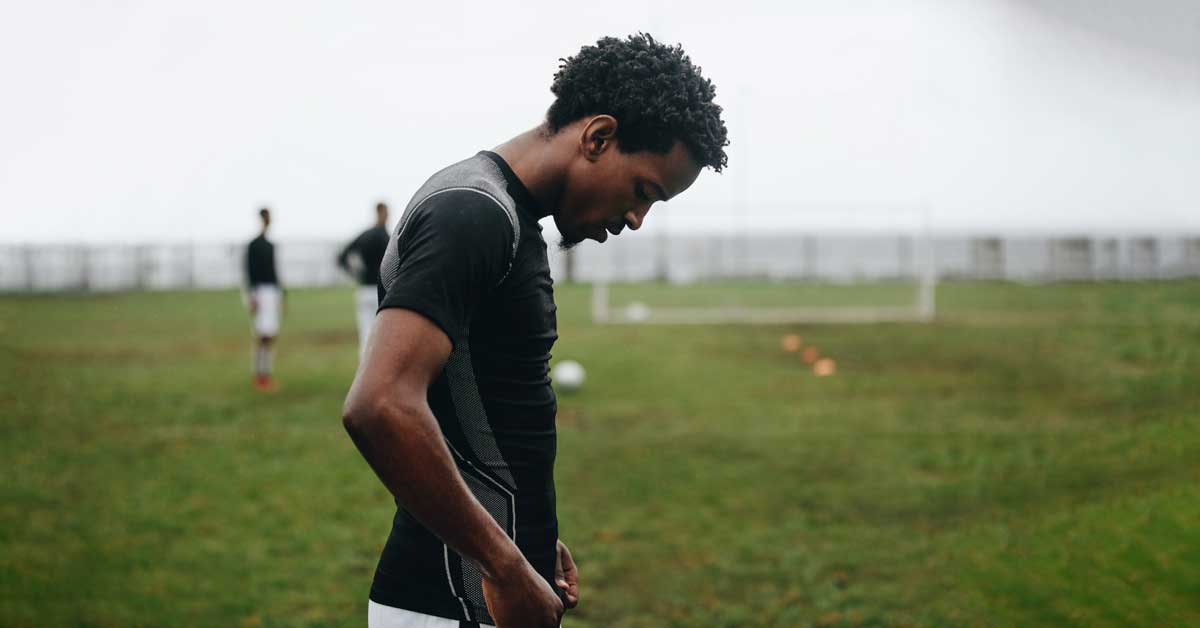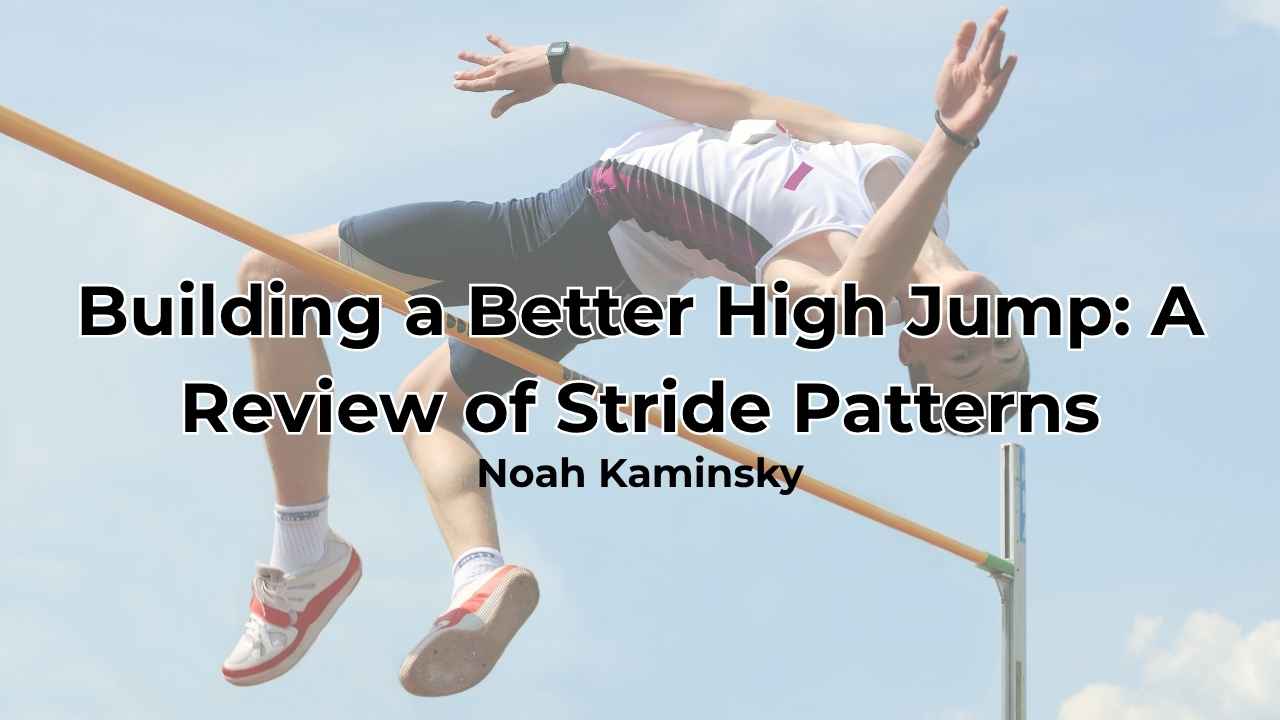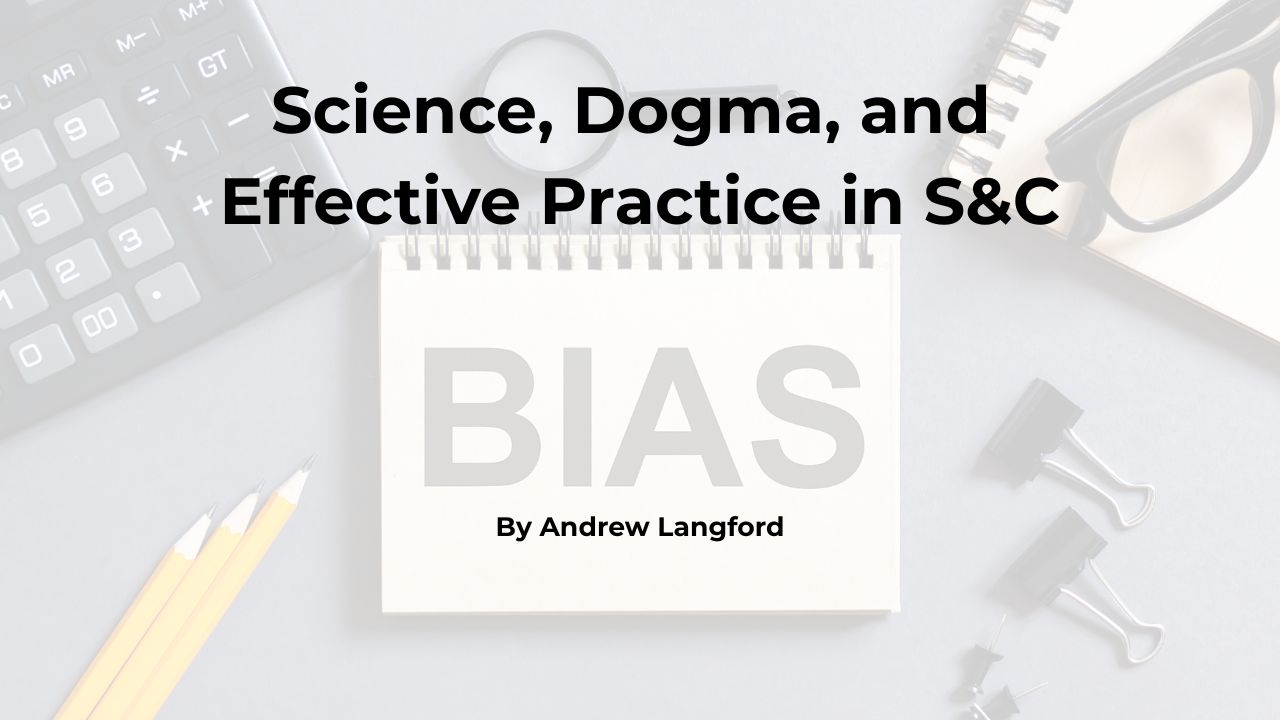There aren’t many certainties in the modern world: perhaps only death, taxes, and Tom Brady winning Super Bowls. However, one thing is certain about the human race—we all sleep (some more than others, as any new parent will tell you). Every human and animal on the planet sleeps, and when you consider how vulnerable we are when we sleep, it must be pretty evolutionarily important to have stuck around all this time!
Despite technological advancements, sleep is even more important in the modern world than when we lived in caves and had to fend off predators. Knowing sleep’s evolutionary importance, you would think it would be a key tenet when we talk about human high performance. Yet if you were to look at your own athletes, how much time do you spend talking about sleep? How much education have your athletes received about sleep? How much is practiced and lived, day in and day out by your athletes?
If we were to look at what the ‘big rocks’ in recovery truly are, they would undoubtedly be sleep and nutrition, says @peteburridge. Share on XTake, for example, the concept of recovery—often, the first modalities that get stressed with players are things like ice baths, saunas, recovery tights, massage guns, and so on. Yet if we were to look at what the big rocks in recovery truly are, they would undoubtedly be sleep and nutrition. Maybe it is due to marketing or a carryover from the popularity of the marginal gains approach, but we sometimes get caught putting too much emphasis on the sand rather than ensuring the big rocks are in place first.
Starting the Conversation
When we do place an emphasis on sleep, the performance benefits can be large. For example, I coach in academy-level rugby, and a lot of our young players live in shared housing in large, but dated, buildings. This can be great for their social lives, but it isn’t that conducive to a good night’s sleep…for a variety of reasons.
One of these athletes asked me help him improve his sleep environment. This started with an audit of his bedroom, and frankly it wasn’t geared at all to a high-performance athlete. He was 6’ 5” and more than 115 kilograms, but he was sleeping on a short single mattress that looked like it had been made in the 1980s. He complained that the springs dug into his back, and this was because it probably had been slept on since the ’80s! The sheets were cheap polyester that made him sweat at night, and his window blind was old and didn’t work properly. To compound this, he was unlucky enough to be on the side of the building facing the rising sun, so the sun would shine in and wake him early in the morning.
With a sleep environment that bad, the fixes were simple: convince him to buy a mattress that fit him, try to get him to invest in some breathable sheets, and then fix the light pollution in his room. After a trip to IKEA to pimp out his bedroom hardware on a budget, we then restricted as much light as we could in the room by “thinking like a vampire.” Following these changes, his sleep hygiene greatly improved.
Subjectively, he said the new arrangements helped massively, and he felt it made him feel “more ready for the day.” Objectively, we used his Fitbit to see if anything had changed. Although the reliability and validity of sleep trackers are questionable—especially when the athlete knows they are being tracked, as realizing a coach is going to see the results causes them to change their behavior—the results were astounding. We had added an extra hour of sleep per day on average in the first week we tracked, and he was spending much less time awake while in bed trying to get to sleep.
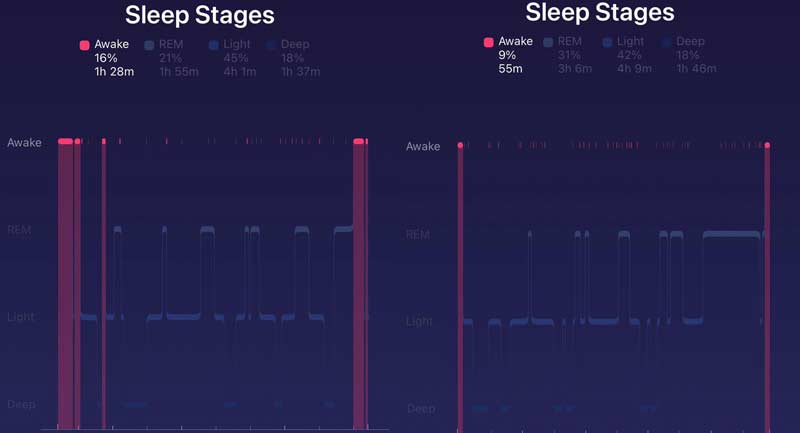
Sleep and Performance
If I told you I could give you a pill that would improve your sprint time by 0.7 seconds, you’d probably take it, right? What if I offered you a pill that would improve your shooting percentage by 9%? You wouldn’t believe what I was offering was available…or legal! Yet that is what a study of Stanford basketball players showed.1 Sure, okay, they may not have been elite basketball athletes, but how about Andre Iguodala of the Golden State Warriors having more than one-third fewer turnovers and a 29% increase in points per minute?2 Elite enough?
You’d want to know what the pill was that they were taking, wouldn’t you?!
The pill that both studies shared was the same, and in fact it wasn’t a pill at all—it was sleep. When Andre Iguodala had more than eight hours of sleep, that’s what happened to his numbers. When the Stanford basketballers extended their sleep, they ran faster and shot better.
This isn’t limited to basketball either—in a longitudinal study of MLB baseball players, the sleepiness scores recorded over a three-year period correlated with whether the players were able to stay in the big leagues or not. Those who reported feeling sleepy found themselves more likely to be out of the league by the end of the study.3
In a longitudinal study of MLB baseball players, the sleepiness scores recorded over a three-year period correlated with whether the players were able to stay in the big leagues or not. Share on XThere could be many reasons for this, one being that when we are sleep deprived, we gas out much quicker. It has been shown that we reach exhaustion 30% quicker in time trials when sleep is compromised.4 Can you imagine being a middle-distance runner and your time is 30% slower just because you got less than six hours of sleep before the race? The consequences to performance are huge.
Luckily, the consequences are not as large for athletes as they are for other industries: In the medical world, getting less than six hours of sleep increased the likelihood of a surgical error by 170%!5 Compare a misjudged pass or errant throw to an error on the treatment table having potentially fatal consequences.
Sleep and Injury Prevention
Sleep doesn’t just enhance performance on the field, it can enhance our body’s functions off it too. Perhaps most relevant right now is that sleep can aid our immune system. Sleep is our first line of defense against things like infections and viruses, with less sleep linked to a far higher chance of catching the common cold.6
Sleep doesn’t just help with prevention; it can be the cure as well. For example, think about the last time you were ill or if you were unlucky enough to have contracted COVID-19—what did your body spend a lot of time doing? Sleeping! Your best defense is also your best offense.
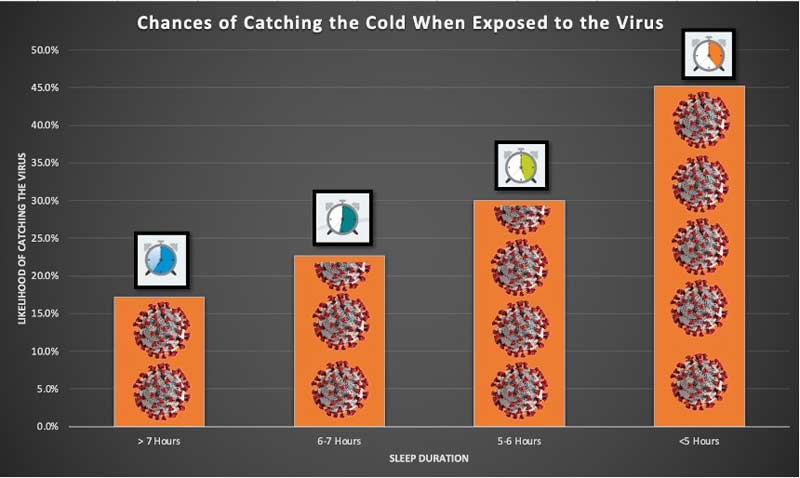
Training days missed due to illness can be attenuated via sleep, but sleep has been shown to have links to the prevention of injury as well. Athletes who sleep less than eight hours a night have a 1.7 times greater risk of injury.7 That’s a large number, especially when you think across all professional sports and how much money is spent on injury prevention. How much of that money is invested in sleep though? It is often the forgotten strategy when it comes to combatting injuries.
Sleep is often the forgotten strategy when it comes to combatting injuries, says @peteburridge. Share on XAfter an outbreak of injuries in baseball, the New York Times ran an infographic that totaled all the collective payroll that was out injured at the time. At one point the NY Yankees were missing 34% of their payroll, which equated to $17,747 per hour being spent on players who couldn’t take the field. I’m not saying that if they had just slept better they wouldn’t be injured, but with such distinct evidence showing how sleep affects performance and injury, shouldn’t we at least pay it a bit more attention? Especially when the investments are that large?
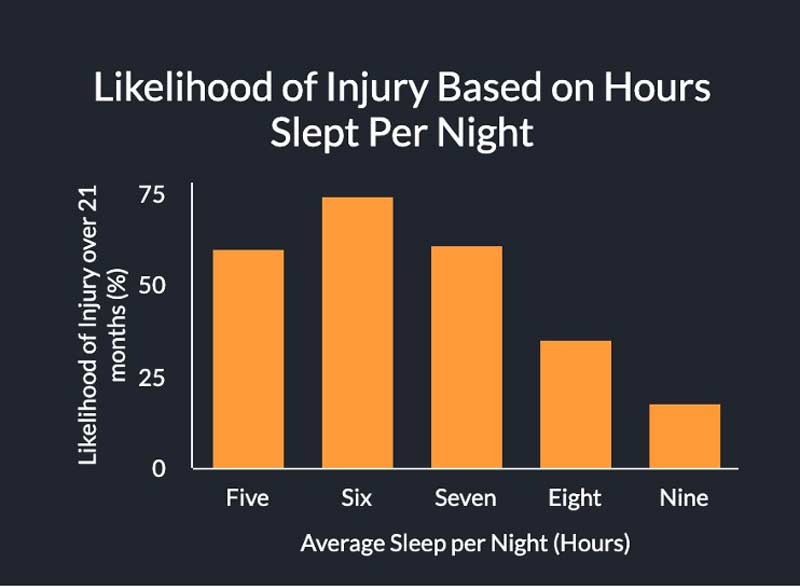
Sleep and Body Composition
Most sports demand that you be in good shape to perform at your best; in sports like sprinting, for example, any non-functional mass will make you slower. In sports like soccer, too much fat mass will limit your ability to go 90 minutes at the tempo that the modern game is played. Do you know what can help your body composition? If you haven’t guessed it already, yes, it’s sleep. A large decrease in sleep (~4 hours) can lead to an increase in the number of calories we consume the next day of around ~300 kcal.8 This is because when we are sleep deprived, we switch on more primal areas of our brain that make us crave calorie-dense food. Sleep loss basically gives us the munchies!
When athletes lose weight, we know that some weight will come from fat mass and some will be muscle. Ideally, we want most of this loss to be fat while clinging on to as much muscle as possible. One study showed that this is largely influenced by the amount of sleep that we have while on this weight loss regimen.9 With sleep dictating where we lose that mass from, you really can sleep your way to a six-pack!
To clarify how profoundly sleep affects body composition, take two athletes: They’ve both been put on calorie-controlled diets, and you’ve prescribed them a tough training regimen to support it. The program has worked and both athletes have lost 5 kilograms of body mass. Great news!
The only difference between the two athletes is one has been getting 8.5 hours of sleep and the other athlete has been staying up late at night playing Fortnite and has only been getting 5.5 hours of sleep. For the athlete who got good sleep, of the 5 kilograms that they lost, 40% was muscle mass and 60% was fat mass. The athlete who didn’t sleep well: 70% was muscle mass with only 30% of their weight loss coming from fat.
The amount we sleep clearly dictates from where on our body we lose our weight. For anyone on a diet or cutting weight like a boxer, this is huge, says @peteburridge. Share on XThe amount we sleep clearly dictates from where on our body we lose our weight. For anyone on a diet or cutting weight like a boxer, this is huge. You might have the same number on the scale, but where would you rather lose it from? Fat or muscle?
Sleep and Learning
Most sports require their players to know detailed tactical systems and plays, and this requires a large amount of learning from week to week. This is to say nothing about many student-athletes who also have to learn their actual studies as well! Either way, good-quality learning and retention of information is key to optimizing training time.
Sleep helps this mental side of the game too, with a decrease in memory learning by as much as 40% in sleep-deprived individuals.10 Studies that have tracked school start time and indirectly tracked sleep opportunity in adolescents have shown that a later start time (which gave the kids more time in bed) leads to a significant increase in grades, taking grade averages from B- to A.11
Whenever we have meetings, we want our athletes to be A-grade students—fully engaged and retaining all the information, not yawning in the back and fighting the urge to doze off. Believe it or not, if you have been awake for 20 hours, your motor function decreases to such a level that it is equivalent to being legally drunk.12 If you think how your speed of thought slows down and your memory gets a bit fuzzy when you’ve had a few beers, you get an idea of what might be going on!
This calls into question how much we truly help our athletes by having workouts scheduled so early in the morning. As much as we’d like them to #SeizeTheDay, we may not be helping as much as we think. Certainly, as coaches it should at least make us think a little more deeply about how we schedule workouts and practices to truly optimize performance. Should we spend lots of money on fancy recovery gadgets, or should we just schedule practice an hour later to give the players a bit more time in bed?
Should we spend lots of money on fancy recovery gadgets, or should we just schedule practice an hour later to give the players a bit more time in bed?, asks @peteburridge. Share on X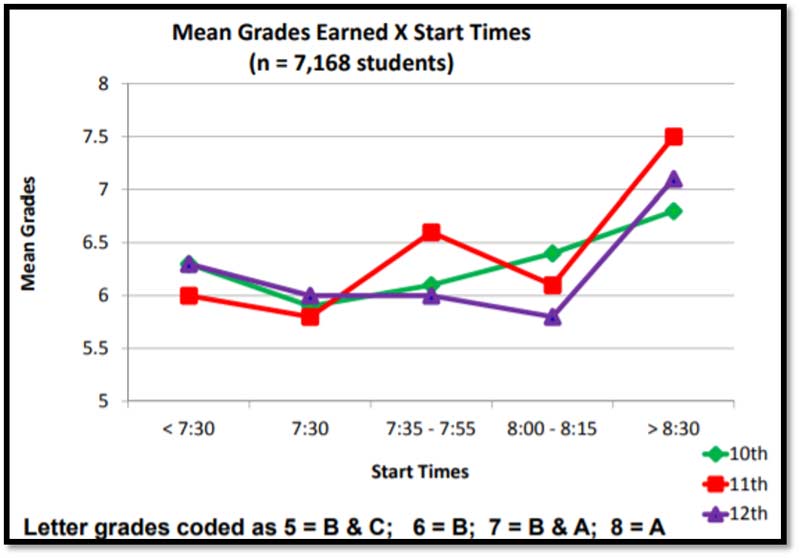
Improving Your Sleep Environment
Once you acknowledge how important sleep is, the next step is having interventions to optimize the sleep environment. These fit into two categories—sleep routine and sleep hygiene.
Sleep Routine
Having a consistent wake and sleep time is one of the most powerful tools at an athlete’s disposal when it comes to improving the quality of their recovery. As anyone who has dieted can tell you, our bodies love a state of homeostasis. The body hates change! It takes a lot of hard work to will it to lose 10 pounds or to gain a couple kilos of muscle.
Having a consistent wake and sleep time is one of the most powerful tools at an athlete’s disposal when it comes to improving the quality of their recovery, says @peteburridge. Share on XMuch is the same with sleep. For example, when you’re at university and living the party lifestyle, if your professors schedule 9 a.m. lessons, it seems like an affront to your human rights. But then you enter the real world, and a 9 a.m. start equates to a substantial lie-in. After an adjustment period, our body clock shifts itself, and the earlier start becomes the norm, even to the point of waking us up on weekends at 6 a.m. (regardless of whether we have anything to be awake for).
Genetically, some of us will be better suited to an earlier or later start, which is due to our chronotype. The easiest way of thinking about your chronotype is deciding whether you are an evening or a morning person. Understanding when you are at your sharpest and trying to fit your training schedule around that will allow you to be much more productive.
Physiologically, our bodies need to drop around 1 to 2 degrees in temperature to drift off to sleep. This is why having a warm bath or shower helps us sleep: not only does it help us unwind mentally, but the water draws heat from the skin, cooling us down. Getting in a regular routine of having a bath or shower before bed is a great way of improving our likelihood of falling asleep quickly when we hit the pillow. This is also why we like to sleep on the cool side of the pillow or dangle our feet outside of the covers. It’s simply temperature control.
With body temperature in mind, as admirable as it is to try and do 100 press-ups and sit-ups before bed because some Instagram guru told you to, that’s not going to be great from a temperature regulation perspective. So, if you are going to jack your heart rate up and have your body temperature rise through exercise or other bedroom activities, be sure to get done long before it’s time to sleep.
Another key intervention is the control of caffeine usage. Caffeine has a half-life of around five hours13 and will stay in your system for a long period of time. So a coffee in the middle of the day may taste nice, but it is still in your system when you want to go to bed. In fact, a cup of coffee six hours before bedtime doubles the time it takes to get to sleep and on average decreased total sleep time by 41 minutes when compared to a placebo.14
This can be especially problematic when caffeine is used as a performance enhancer before competing in the evening. It isn’t uncommon for athletes to be wide awake at night after competition. Ideally, if you can periodize your caffeine intake in the week, you won’t need as much come game day to have a performance effect, which will help limit the side effect of not being able to sleep at night afterward.
Ideally, if you can periodize your caffeine intake in the week, you won’t need as much come game day to have a performance effect, says @peteburridge. Share on X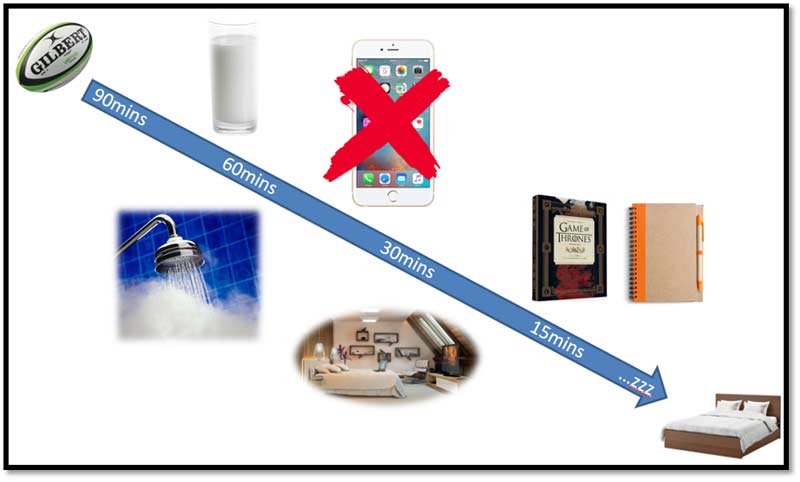
Sleep Hygiene
Once you have a steady sleep routine in place, the next area for improvement should be improving your sleep hygiene. This includes things like your exposure to light, how comfortable your sleep environment is, and how you go about regulating your temperature when you are in bed.
The most publicized intervention centers on the use of electronic devices around bedtime and how this affects our bodies’ natural functions to prepare for sleep. The issue is that phones and tablets emit a large amount of blue light, which blocks the release of melatonin (the body’s natural hormonal signal for sleep). This keeps us from falling asleep as easily and disrupts the quality of sleep we get when we do fall asleep. Unfortunately, the use of electronic devices is also the hardest habit to shake, especially with young players.
Ideally, there would be no use of electronic screens at least 30 minutes before bed, but having worked with many young athletes, I know this can be unrealistic no matter what you tell them! Night Shift mode on an iPhone—a screen setting that dims the amount of blue light emitted from the phone—can be set to help reduce the damage if the player will be on their phone regardless of your advice. For those athletes who must check their social media, a compromise of no phones in the bedroom is a feasible strategy. It might not be 30 minutes before bedtime, but at least leaving the phone off or out of the room completely as they prepare to go to bed can stop the temptation to mindlessly scroll through social media or have notifications wake them from their slumber.
An audit of the bedroom can reveal many other sources of light, and restricting light before bed should be encouraged. Utilizing blackout blinds, covering TV standby lights, and blocking electrical charging lights can make a big difference in how dark your room is. The darker the better! A simple strategy to achieve true darkness is to wear an eye mask. This can be particularly useful when crossing time zones or trying to nap during daylight hours.
On the flip side, light in the morning is an important signal to start feeling awake. So, a light alarm clock, which progressively gets brighter and acts as a steady sunrise, can help you keep your sleep routine. Light alarm clocks won’t make up for a poor night’s sleep, but they can help you feel more awake and focused when you do wake up.
Anyone who has lived on a busy street or had neighbors performing house renovations knows that noise pollution is also a big threat to a good night’s sleep. Some of these factors that affect our sleep environment are uncontrollable, but there are some things you can do to at least reduce the effect. For example, sleeping in a bedroom that faces the quiet side of the house, using ear plugs, or employing white noise machines can all reduce the likelihood of being rudely awoken by loud noises.
The second biggest factor when it comes to sleep hygiene is how comfortable our sleep environment is, and it makes a huge difference in how effectively we sleep. The British Cycling team was renowned for their attempts to improve their sleep environment on the road by bringing their own pillows and mattresses, and even using trash bags to black out hotel windows to ensure all variables were controlled.
Getting the right pillow and mattress for your sleep style makes a big difference, with some products better suited to whether you sleep on your side, your back, or your front. Furthermore, ensure that the comforter/duvet is the correct weight for the time of year, so you aren’t shivering or sweating while sleeping. Having your comforter/duvet and bedding made from natural fibers will help better regulate your temperature. Alongside the pillow and mattress, your sheets can make a big difference in comfort too, with hypoallergenic, natural materials like cotton with higher thread counts bringing about better comfort and helping to keep you cool.
Once you have all the pieces in place, it makes sense to maintain them well too. Sleeping on fresh sheets regularly should be the goal. Think about how you feel when you sleep on fresh sheets…how good did that feel? So why wouldn’t you want to have this feeling regularly? If you think of all the dead skin and dirt that starts to accumulate, there’s no wonder bedding doesn’t feel as comfortable when you’ve been sleeping on it for a while. Among academy rugby athletes, it is frightening to hear how bad their sleep hygiene is—some players are unable to remember how long it was since they last changed their sheets, if at all!
Don’t Forget About Sleep
With so much focus on training and competition, it is important that we don’t forget about sleep due to its effects on performance, immunity, body composition, injury prevention, and learning. Share on XA lot of these small interventions can add up to large improvements in our athletes’ sleep environments. With so much focus on training and competition, it is important that we don’t forget about sleep due to its effects on performance, immunity, body composition, injury prevention, and learning. We should continue to look for opportunities to optimize our athletes’ sleep environment by improving their sleep routine, temperature control, and comfort while being aware of pitfalls like excessive light and caffeine consumption. Luckily, these things aren’t very costly, but they will have a huge effect on performance.
Since you’re here…
…we have a small favor to ask. More people are reading SimpliFaster than ever, and each week we bring you compelling content from coaches, sport scientists, and physiotherapists who are devoted to building better athletes. Please take a moment to share the articles on social media, engage the authors with questions and comments below, and link to articles when appropriate if you have a blog or participate on forums of related topics. — SF
References
1. Mah CD, Mah KE, Kezirian EJ, and Dement WC. “The effects of sleep extension on the athletic performance of collegiate basketball players.” Sleep. 2011;34(7):943-950.
2. Berger K. “In multibillion-dollar business of NBA, sleep is the biggest debt.” CBS Sports. 6/17/16.
3. Potenziano BJ, Pfeifer PE, Rogers SL, and Winter WC. “Predicting major league baseball (MLB) player career longevity via sleepiness measurements. Sleep. 2013;36 (Abstract Suppl, A326).
4. VanHelder T and Radomski MW. “Sleep deprivation and the effect on exercise performance.” Sports Medicine. 1989;7(4):235‐247.
5. Rothschild JM, Keohane CA, Rogers S, et al. “Risks of complications by attending physicians after performing nighttime procedures.” JAMA. 2009;302(14):1565-72.
6. Prather AA, Janicki-Deverts D, Hall MH, and Cohen S. “Behaviorally assessed sleep and susceptibility to the common cold.” Sleep. 2015;38:1353-1359.
7. Milewski MD, Skaggs DL, Bishop GA, et al. “Chronic lack of sleep is associated with increased sports injuries in adolescent athletes.” Journal of Pediatric Orthopaedics. 2014;34:129-133.
8. Greer SM, Goldstein AN, and Walker MP. “The impact of sleep deprivation on food desire in the human brain.” Nature Communications. 2013;4:2259.
9. Nedeltcheva AV, Kilkus JM, Imperial J, Schoeller DA, and Penev PD. “Insufficient sleep undermines dietary efforts to reduce adiposity.” Annals of Internal Medicine. 2010;153:435-441.
10. Simon HB. “Sleep helps learning, memory.” Harvard Health Blog. 2/15/12.
11. Wahlstrom KL. “Later School Start Times.” Presented at Teens & Sleep Conference, 2013.
12. Williamson AM and Feyer AM. “Moderate sleep deprivation produces impairments in cognitive and motor performance equivalent to legally prescribed levels of alcohol intoxication.” Occupational and Environmental Medicine. 2000;57:649-655.
13. Institute of Medicine (U.S.) Committee on Military Nutrition Research. Caffeine for the Sustainment of Mental Task Performance: Formulations for Military Operations. Washington (DC): National Academies Press (U.S.); 2001. Chapter 2: “Pharmacology of Caffeine.”
14. Drake C, Roehrs T, Shambroom J, and Roth T. “Caffeine effects on sleep taken 0, 3, or 6 hours before going to bed.” Journal of Clinical Sleep Medicine. 2013;9(11):1195-1200.
15. Wahlstrom KL. “Changing times: Findings from the first longitudinal study of later high school start times.” NAASP Bulletin. 2002;96:3-21.

